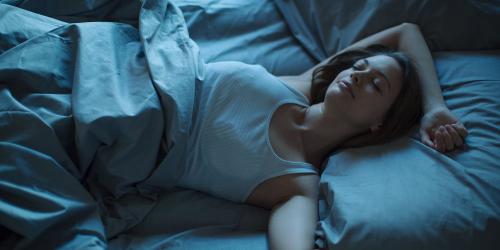Having a disturbed sleep, restlessness, gorging sleeping pills or being completely thrown away after a trip are situations that, in the long run, can increase the effects of fatigue on our body.
And the solution is not necessarily in the taking of drugs.
So to sleep "like a baby", we turn to more "natural" methods and we chase the bad habits that ruin our internal clock.
I dream of a real good sleep, without nocturnal awakenings
This time, it will focus on carbohydrates dinner and limit the excitants . Slow sugars (pasta, rice, potatoes, semolina, etc.) deliver energy throughout the night, continuously. They promote the release of serotonin with tranquilizing properties.
But watch out for sweets too sweet (chocolate bars, cakes ...): quickly swallowed in front of the television, they bring a considerable glucose intake, followed by a massive secretion of insulin (the hormone that helps to normalize the rate of blood sugar).
After the excess comes the lack. And the drop in blood sugar causes nocturnal awakenings. In addition, sweet sodas, coffee and tea are to be limited, just like alcohol. The latter is sedative in small doses, but in excess, he knocks at bedtime before exciting in the middle of the night.
Sleep is then agitated, interrupted and inhabited by nightmares. Finally, the cigarette containing nicotine, exciting notorious central nervous system, better not to over-smoke under penalty of having a light sleep and fragmented.
I want to get sleeping pills
Subscriber for fifteen years to sleep pills? Delicate to stop abruptly; there could be a syndrome of lack and a return to square one, with disillusion as a bonus. Weaning may take several months, with a very gradual decrease in doses and spacing.
Example: if you are used to taking a tablet every day, reduce your dose by one-quarter to two-three-quarters of a tablet on even days, a whole tablet on odd days. After ten days, and if all goes well, go to three quarters of tablet alternately with a half-tablet for ten days again, time to feel good with this new dosage. And so on, until there is only a quarter of a tablet left. At this point, either you continue with a quarter tablet every other day; either you stop, and you park for a month to a quarter of a daily tablet before retrying the total stop.
Why act in stages? There are receptors in the brain that are accustomed to receiving "their dose", according to Sylvie Royant-Parola. By proceeding gradually, they are gradually desensitized, without much effects related to weaning (insomnia, nocturnal awakenings, anxieties).
The most motivated arrive however by the strong method. They go from one tablet to nothing in three days, accept the insomnia that accompanies the lack, go to bed later, get up earlier. After eight days, their bodies finally accept it and secrete natural hypnotic substances again. It's draconian but not impossible.
I recover with difficulty from a sleepless night
If, at 20, we can go on several sleepless nights without too much damage, it becomes more difficult at 40 or 60 years.
Again, there are two strategies for recovering faster. Either play the marmots the day after his night of madness: hanging out in bed, slouching on the couch, siping herbal teas, eat light (without the slightest drop of alcohol) ... and collapse in the evening, the first series of yawning come, without letting go of his sleep train.
Either opt, in the afternoon, for a benevolent nap of ninety minutes maximum, under pain, if not, to really shift and have a lot of trouble falling asleep later.
One can never fully recover from a sleepless night: when, for the purposes of an experiment, Randy Gardner was deprived of sleep for eleven days and eleven nights, he slept the next night only fourteen hours and thirty minutes in a row!
I have nightmares
If you live a tormented life or rich emotions during the day (promotion, pregnancy, existential turn ...), there is a good chance that your nights are inhabited by bad dreams. They are here to express the inner tumult and tame fears.
However, certain substances or behaviors create or accentuate the phenomenon: beta-blocking drugs, corticosteroids, Ventolin, certain sleeping pills such as Rohypnol, but also too rich and watered meals, fever or pain. Talk to your doctor.
I do not sleep on the plane
We tell you straight out: the best way to count sheep is in business class, lying in a good bed. In second, it will be tricky.
But what do sleep specialists do when they travel to the other side of the world? Everything depends on the flight time. If they are on a long haul, they swallow their Stilnox or Imovane (short-acting) as soon as they are in the aircraft, ask the hostess not to be disturbed, put a mask on their eyes and wake up an hour or two before the arrival, without being interrupted in full sleep under hypnotic.
On flights of less than six hours, another strategy: especially no sleeping aid, under penalty of waking up in full chemical sleep, that is to say, in a second state, very unpleasant or dangerous. Remains another solution to "relax", a small glass of Bordeaux or champagne (but not excessively).
I'm jet-lagged
After three time zones, we threatened to "jet lag": fatigue and daytime sleepiness, trouble sleeping at night, urge to raid the fridge at 3 in the morning ... not to mention the memory that is on the loose.
By playing on light, physical activity and food, we can re-synchronize faster, says Sylvie Royant-Parola. Take the example of a return from New York: at midnight in France, there is still only 19 hours in our head; it is therefore necessary to advance its cycle to encourage early sleep and early awakening.
For this, nothing better than putting on sunglasses in the afternoon, playing sports in the morning and avoiding going out at night; otherwise, be sure to wake up!
For a few days, it is recommended to swallow a good plate of cereals - or a pasta dish for the most courageous - on the way out of bed. In fact, slow sugars play a decisive role in synchronizing the body. Depending on the time at which they are eaten (breakfast or dinner), you can move forward or backward. If you come back from Singapore, you have to eat up your starchy foods at dinner, in order to delay bedtime.
And melatonin ? This hormone works mostly in the west-east direction. For a return of the United States, take 1 to 3 mg around 19 hours. But beware, it does not work on everyone and is by no means a miracle cure. Three days should be enough to recalibrate sleep.
I doze after lunch
It's normal. Between 13 and 15 hours, whatever we do, we are programmed to have a decrease of vigilance, even drowsiness. The peaks of accidents at work or on the road prove it. And this physiological phenomenon can be aggravated by a lunch too rich, especially if it is watered. It is a vicious circle: the more we eat, the more we digest, and the more we need blood flow to the digestive tract. As a result, blood is flowing everywhere, especially in the muscles and brain.
The cure ? Avoid meals with dishes in sauce (because of the slow digestion of fats) and prefer protein to breakfast (grilled meat, eggs, fish). They energize the brain and provide energy to the whole body.
Napping me tired
The siesta , supposedly so sovereign for physical recovery, does not succeed to everyone. Some get up with a leaden body and head in the fog. To avoid this, do not sleep until five to twenty minutes. The time to close your eyes, to empty oneself, to let oneself be snared by sleep and to resurge immediately.
The letting go relieves, since we no longer fight against drowsiness that takes hold of itself (as if we pressed the button "pause" of his programmer). However, good "siestors" can sleep an hour - or more - and get up refreshed. Generally, they are very morning and go to bed late!
My man is a big sleeper, me not
How to tune tempos within your couple? It's difficult. The rhythm of sleep and its duration are largely genetically programmed for each of us. Some will sleep five or six hours a night and will wear like a charm; others will need eight or nine hours to be fit to face their day.
If you are a little sleeper, the only solution is to sneak quietly out of bed, so as not to wake up your companion. To sleep too much is not to sleep better, it is an idea to take off the head. The key is to just sleep.
My child refuses to go to bed
Among the children too, we find small and heavy sleepers (we see them at the age of 3 or 4 years). Some fall asleep at 11 pm, get up at 7 am and are very well off nap; while most of their kindergarten peers need a good ten hours of sleep or more.
A single instruction for parents: recognize the rhythm of his child and his needs. If he is sleepy, he is usually grumpy and angry (he fights fatigue). If he has not slept enough, he is irritable and agitated during the day. Regular schedules lead him to guess, and therefore better accept, the time to go to bed. When his eyes blink, he yawns and his attention drops, when he sucks his thumb or complains of being cold, we can drag him on the gentle slope of sleep.
For example by gradually plunging it into darkness, thanks to a dimmer, and ensuring that the volume of music or television in the rooms next door is not too high. At 1 year, think of lullabies; at 2 years, nursery rhymes; to 3 years and over, to the little story of the evening. The rituals are reassuring and prepare for sleep.
To avoid, on leaving, total silence, distressing; the child needs to feel that life goes on outside his room.



